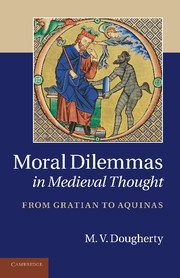Book contents
- Frontmatter
- Contents
- Preface
- Introduction
- 1 Gratian and his glossators on conflicts in the natural law
- 2 Twenty moral dilemmas from two early thirteenth-century summaries of theology: William of Auxerre's Summa aurea and the Franciscan Summa Halesiana
- 3 Raymond Lull and moral ensnarement in the Vita coaetanea
- 4 Thomas Aquinas, moral dilemmas, and a missing article from Quodlibet XII
- 5 Thomas Aquinas on failures of practical reasoning: Why synderesis doesn't inoculate agents against malformed conscience dilemmas
- 6 Moral dilemmas in the early Thomistic tradition: Johannes Capreolus and the Deceiving Demon Dilemma
- Conclusion
- Bibliography
- Index
3 - Raymond Lull and moral ensnarement in the Vita coaetanea
Published online by Cambridge University Press: 03 May 2011
- Frontmatter
- Contents
- Preface
- Introduction
- 1 Gratian and his glossators on conflicts in the natural law
- 2 Twenty moral dilemmas from two early thirteenth-century summaries of theology: William of Auxerre's Summa aurea and the Franciscan Summa Halesiana
- 3 Raymond Lull and moral ensnarement in the Vita coaetanea
- 4 Thomas Aquinas, moral dilemmas, and a missing article from Quodlibet XII
- 5 Thomas Aquinas on failures of practical reasoning: Why synderesis doesn't inoculate agents against malformed conscience dilemmas
- 6 Moral dilemmas in the early Thomistic tradition: Johannes Capreolus and the Deceiving Demon Dilemma
- Conclusion
- Bibliography
- Index
Summary
At the venerable age of seventy-five, the long-bearded philosopher Raymond Lull (c. 1232–1316) boarded a ship from his home in Majorca and sailed across the Mediterranean Sea to the North African Saracen city of Bougie. Upon disembarking, Lull immediately went to the main square of the city and began shouting wildly in Arabic. The Vita coaetanea records his words as, “The Christian religion is true and holy and acceptable to God; the Saracen religion, however, is false and full of error, and this I am prepared to prove.” The spectacle of a blaspheming foreigner drew the attention of the town's senior religious leader, who gave orders that Lull be brought before him. Shortly thereafter Lull subjected him to an exotic disquisition that employed various subtle Neoplatonic metaphysical distinctions. Baffled by this display, the religious leader ordered Lull's immediate imprisonment. The angry assembled crowd then seized Lull, beat the old man with fists and sticks, forcefully dragged him by his beard, and then locked him away in the sewer pit of a thieves' jail “where for some time he led a painful existence.” After an incarceration for a year and a half, Lull was expelled from the city and placed on a ship for Genoa, but when it was ten miles offshore from the port of Pisa a violent storm arose and capsized it.
- Type
- Chapter
- Information
- Moral Dilemmas in Medieval ThoughtFrom Gratian to Aquinas, pp. 85 - 111Publisher: Cambridge University PressPrint publication year: 2011



